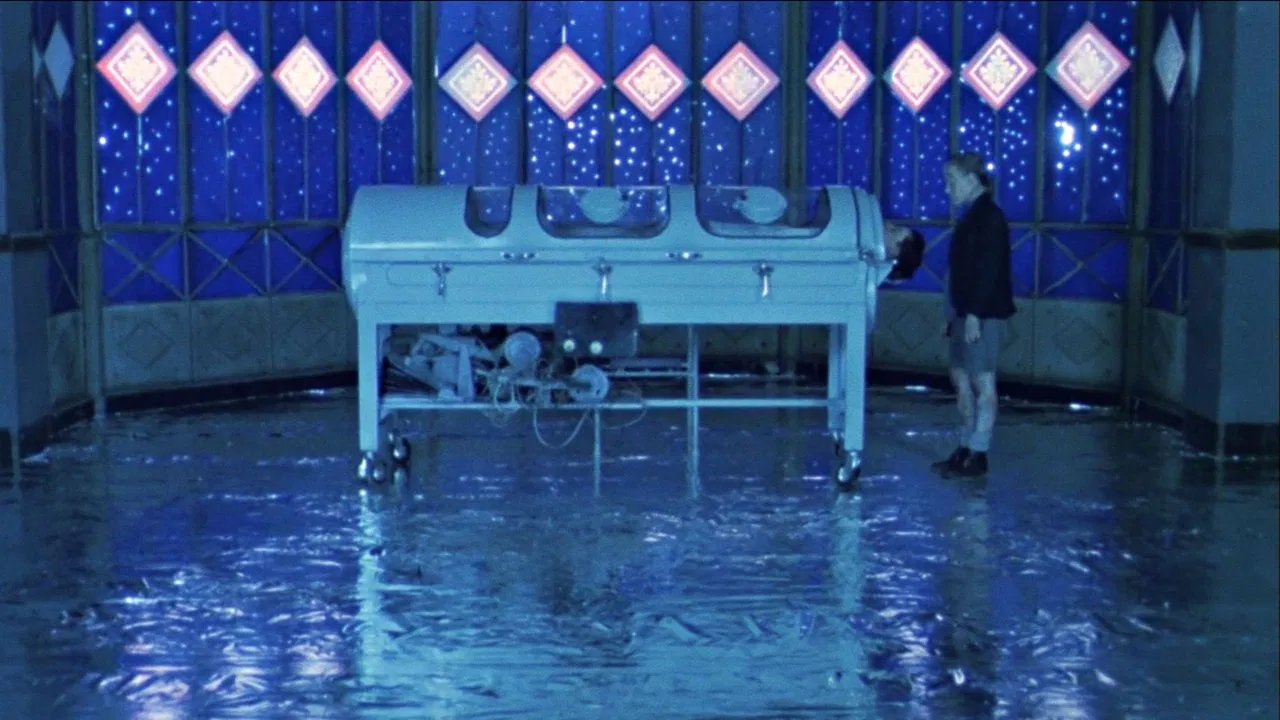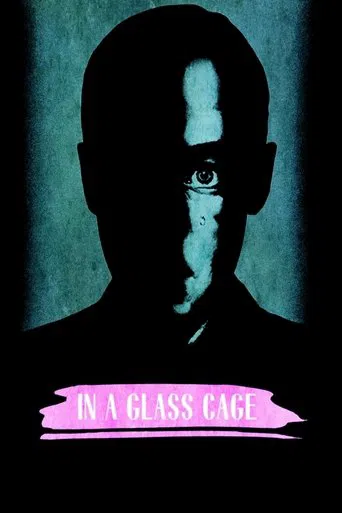

Spanish ¨cult movie¨ with astonishing images and deliberately paced . This moving as well as strong story is an emotive recounting and an intense horror drama , including tragedy , deaths and bloody executions by hanging , stabbing and other means . After torturing and murdering his latest victim , a Nazi doctor named Klaus (Gunter Meisner) throws himself off a roof , all of it has been secretly witnessed by a little boy . Some years later, his suicide failed attempt , his wife Griselda (Marisa Paredes, Almodovar's ordinary) decides to contract a worker to care him . As Klaus is forced to be confined to an artifact contains an iron lung and to accept a mysterious boy called Angelo (David Sust) as his nurse under threat of blackmail . Meanwhile , Angelo befriends Klaus' daughter (Echevarria) , and the rare teenager possesses the Klaus's diary, which details his wartime experiments in concentration camps and his ulteriorly descent into pedophilia and killing . The picture is full of suspense , mystery , screechy bursts of violence and lots of blood and gore . As this terror as well as claustrophobic flick shown to the audience gets more and more violent . This slick horror feast is a triumph of style over movie logic . It's packed with overwhelming as well as upsetting images , excessive violence and grotesque killings . Here is treated some disturbing issues such as fetish for young boys , pedophilia , sodomy , eerie tortures and grisly killings . Good acting by Gunter Meisner as former Nazi doctor-turned-pedophile , paralyzed from the neck down and who subsequently feels guilt . Günter Meisner originally turned down the role , horrified by the story . According to Villaronga , Meisner called him a few weeks later to accept the part, arguing he couldn't stop thinking about it . Gunter was a character actor who worked continuously in movies due to his aristocratic style , making him ideal for typecasting in British and later American films as Nazis and other vile , despicable roles , what was ironic about his typecasting as a Nazi is that he stayed in a Nazi death camp during World War II . Although well-known for playing Hitler and various others warlike movies , Meisner was a fine actor who played several support roles , being specially known for his secondaries in ¨The Boys from Brazil¨ , ¨Night crossing¨, ¨Ace of Aces¨ , ¨Avalanche Express¨ and his character as Mr Slugworth in ¨Willy Wonka & the Chocolate Factory ¨ . Furthermore , disturbing acting by David Sust as a boy secretly witnessed the doctor's torture , displaying his ambition to follow in the older man's footsteps and finally unleashes his own criminal spree . Director/writer Agustí Villaronga said that the origin of the story came when he read about Giles De Rais (1404-1440), a devoutly religious follower of Joan of Arc who fought valiantly on her side and was later trialed and executed by the Catholic Church for heresy and sexual crimes committed against children . As Rais served as a commander in the Royal Army, distinguishing himself by displaying reckless bravery on the battlefield during the renewal of the Hundred Years War . He killed, or ordered to be killed , a great but uncertain number of children after he committed sodomy upon them . In fact , forty bodies were discovered in Machecoul , France , in 1437 . Gilles' body-servant Étienne Corrillaut , known as Poitou, was an accomplice in many of the crimes and testified that his master hung his victims with ropes from a hook . The victims were killed by decapitation, cutting of their throats, dismemberment, or breaking of their necks with a stick . Rais's prosecution would be on charges which included murder , sodomy, and heresy. The precise number of Gilles' victims is not known, as most of the bodies were burned or buried. The number of murders is generally placed between 80 and 200; a few have conjectured numbers upwards of 600 . The victims ranged in age from six to eighteen and included both sexes.Downbeat and frightening musical score by Javier Navarrete . Dark as well colorful cinematography by Jaume Peracaula . This motion picture titled ¨In a glass cage¨ or ¨Tras el Cristal¨ was compellingly directed by Agusti Villaronga . Agusti was born in 1953 in Majorca, Balearic Islands ; he uses to make films including genuine chills , suspense , mystery and dark atmospheres . His movies pack excellent creation of taut , thriller , emotions and rare atmospheres such as ¨Aro Tolbukhin¨ , ¨El mar¨ , ¨El Niño De la Luna¨ also starred by Gunter Meisner and especially ¨Black bread¨ or ¨Pan Negro¨ , or Pa Negre¨ , this was his greatest success , winning several Goyas .
... View MoreFirst and foremost, this film is not an easy one to watch and comes with a trigger warning for anyone sensitive to themes of rape and child molestation. -Spoilers-This film is centered around the character of Klaus, an ex Nazi doctor who has presumably escaped Germany after the war. We learn from the offset that Klaus has an animal-like lust for sexually torturing and killing young children. Eventually the mental strain of this becomes too much and he attempts suicide, jumping from the rooftop of his home. Unsuccessful, Klaus is confined to a giant iron and glass lung which serves as his life support as well as his prison, as he is paralysed from the neck down. His wife, Griselda, employs a young man, Angelo, to help care for Klaus. Unbeknown to her that Angelo was previously groomed by Klaus.We learn that Angelo has taken on the role of Klaus, sexually assaulting and murdering young children to appease him. He does this whilst also grooming Rena, Klaus' 7 year old daughter. -All in all when reviewing this film you need to remove your thoughts of the content and focus on how it was executed. The heavy use of blue tinting and poor lighting makes the scene feel cold and surgical in appearance. This, coupled with the portrayal of Angelo's almost emotionless character makes the film feel so much more intoxicating to watch and leaves you also speechless and cold inside as we are forced to sympathise with a paedophile. It's a film that reminds oneself of just how primal and horrific human nature can be. The ending of Rena climbing on top of the glass cage that Angelo now inhabits gives a chilling feeling of how the cycle of abuse continues, yet creating an ending that could still be argued as ambiguous. 7/10
... View MoreIn Spain, the former Nazi doctor Klaus (Günter Meisner) tries to commit suicide jumping off the roof of his manor. However, he survives with the entire body paralyzed and dependable of an iron lung with glass sides. His wife Griselda (Marisa Paredes) decides to hire a nurse since she does not bear the situation. Klaus asks Griselda to hire Angelo (David Sust), a mysterious teenager that appears in their house. Angelo befriends Klaus' daughter Rena (Gisèla Echevarría) and sooner it is shown that Klaus was a pedophile that loved to feel the fear of death in young boys before abusing and killing them. Further, Angelo is a disturbed and totally insane victim of his experiments that intends to follow the insanities described in Klaus' diary and incorporate his personality."Tras el Cristal", a.k.a "In the Glass Cage". Is one of the most dark, bizarre and disturbing films that I have recently seen. The cruelty of Klaus with the boys described in his diary is unthinkable and so sick that it is hard to believe that a normal person may have written this story.The performances are top-notch and the conclusion is open to the most different interpretations. I understand that Angelo has followed the footsteps of Klaus and ended in the iron lung like his mentor. Rena is so disturbed with the revelations about her father that she is insane and will follow the footsteps of Angelo. In the Extras in the Bonus Disc, the director Agustí Villaronga provides additional information about "In the Glass Cage", "Black Bread" and "The Sea" very interesting. My vote is eight.Title (Brazil): "Prisão de Cristal" ("Cristal Prison")
... View MoreIN A GLASS CAGE (Agustí Villaronga - Spain 1987). This Spanish shocker certainly offers us no warm portrait of humanity, tackling some extreme material involving Nazis and child abuse, that will undoubtedly shock many. It caused massive walk-outs on its initial release in 1987 and, mainly because of the controversial subject material, it quickly vanished into obscurity.Klaus (Gunter Meisner) is a former Nazi medical experimenter, a job that enabled him to commit the most appalling sex-crimes against young boys. Now, not long after the war, he lives incognito somewhere in Catalonia, still sought after by the authorities, but relatively safe for the time being in Franco's Spain. But soon, he again gives in to his depraved desires, until shame and despair drive him to jump off the roof in an unsuccessful suicide attempt. Because of his jump, he is paralyzed from the neck down, kept alive on an iron lung in the enclosed surroundings of his own home, where he is ministered by his resentful wife Griselda (Marisa Paredes) and her young daughter Rena (Gisela Echevarria). Soon Angelo (David Sust) enters his environment who offers his services as a nurse. Against Griselda's judgement, Klaus insists that the visitor be allowed to take the post. Soon a perverse relationship develops between Angelo and Klaus, becoming ever more macabre as Angelo reveals he has found diaries detailing Klaus' wartime activities.Director Villaronga manages to built up the tension and suspense in an exceptionally effective manner. Very little violence is shown on screen, but it makes the film all the more disturbing. After it becomes clear Angelo is losing his mind and grows more insane (and murderous), the film grows more intense every minute.The film was carefully designed by director Agustí Villaronga who uses basically one set, a large Mediterranean villa. There's an ice-cold blue look, blueish lighting, blue clothes, everything has the same tone, right till the unforgettable closing image in the last scene. The masterfully orchestrated score and the universally supreme performances (the young David Sust is especially impressive in his screen debut) make this a near perfect film.A tough recommendation and not for all tastes, but frankly, any adult who's not able to cope with material like this, shouldn't be allowed to walk the streets at night. Unrightfully dismissed by many as as just a gruesome shocker, there's much more on offer here. An exceptional achievement, clearly deserving wider exposure.Camera Obscura --- 9/10
... View More